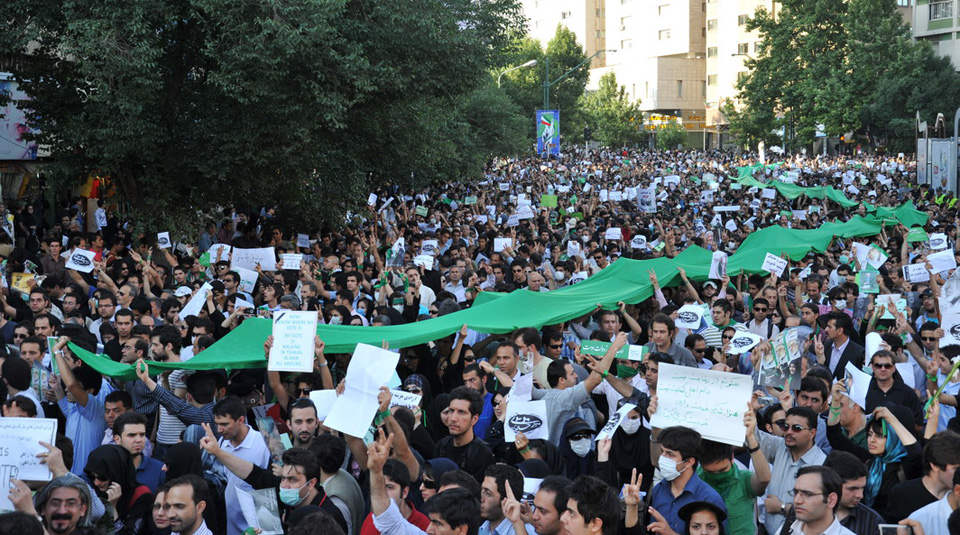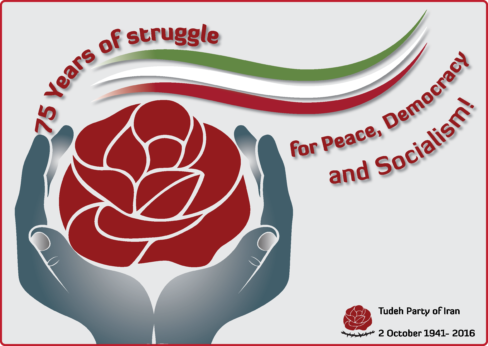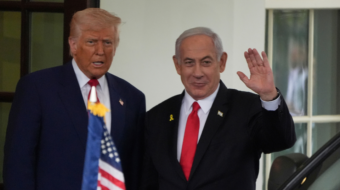
The following is an abridged version of an interview from the UK-based newspaper Morning Star with Tudeh Party of Iran spokesperson Mohammed Omidvar on the occasion of the party’s 75th anniversary. Omidvar also analyzes the situation in Iran today. The text has been edited for length, style and clarity.
Q: The Tudeh Party of Iran is celebrating its 75th anniversary; during this period, what would you describe as the main focus of your party’s struggle in relation to Iran?
A: On Oct. 2, 2016, we celebrated the 75th anniversary of the party, which was established by communist political prisoners freed from the Shah’s jails and other national democratic personalities. The birth of our party happened in a period when Iran was struggling with social underdevelopment, the widespread interference of colonial powers and the rule of reactionary forces.
Within a short period of time, it became a mass party, organizing tens of thousands of workers, establishing a trade unions’ women’s democratic organization, organizing youth and students, as well as a mass peace movement across the country.
Clearly this created significant challenges for imperialism and reaction. They feared, and still fear, the ideological and political foundations of the party, and its ability to organize workers and oppressed people to the degree that, during the 75 years of our existence, we have only been able to enjoy legal status for brief periods of time.
We consider the party as the party of the Iranian working class, which for the past 75 years has been struggling against imperialist intervention in Iran, for the democratic rights and freedom of our people and for socialism. Even the critics of our party admit that ideas such as labor law, workers’ rights to establish syndicates and trade unions, equal rights for women, women’s right to vote and participate in the socio-economic and political life of the country, as well as ideas such as free health and education and land reform in favor of the peasants were first introduced into Iran by the Tudeh Party.
It is no accident that our party, throughout its history, has been subjected to numerous attempts to suppress and destroy it, in which thousands of our members have been exiled, imprisoned and killed. During the 1988 massacre of political prisoners in Iran, the overwhelming majority of our party’s Politburo, Central Committee and hundreds of party leaders, members and supporters were killed by [Ayatollah] Khomeini’s regime.

Q: What is your party’s assessment of President Rouhani’s government, which is widely considered to be the architect of successful negotiations which settled the nuclear dispute and ended sanctions? Have the Iranian people seen any improvements?
A: The foreign policy of Iran’s theocratic regime, under the direction and leadership of Ali Khamenei during the past two decades, has been nothing but disastrous. It has resulted in dangerous tensions within the region and devastating economic sanctions imposed by imperialism, which broke the back of the country’s economy and made life unbearably hard for millions of Iranians.
The Iranian regime started its secret negotiations with the United States more than two years before Rouhani was elected, at the time of the Ahmadinejad government. Despite the almost daily political skirmishes played out in front of the world media, to strengthen the negotiation team’s hand, the agreement with the West was closely orchestrated and directed by Iran’s leader, and it was with his full approval that the agreement was signed.
Our party welcomed the negotiations as the only way of resolving the disputes with the U.S. and Europe concerning Iran’s nuclear policy and of reaching a comprehensive agreement that protects the national interests of Iran. But we also warned against other aspects of the negotiations, which aimed at integrating Iran into the U.S. plan for “New Middle East.”
Despite the ending of sanctions, Iran’s economic situation has not improved. This is due to the neoliberal policies of the regime. Even according to official statistics, the economy is stagnant, Iran’s national industry is declining fast, millions of people are living below the regime’s defined poverty line, over 3 million people are out work (in some provinces this comprises of more than 60 percent of population) and there is rampant corruption and growing inflation.
Q: In June, there was the reported case of the hunger strike of trade unionist Ja’far Azimzadeh. What is the state of human rights in Iran, especially with respect to political and trade union activities?
A: The successful worldwide campaign to save the life of Mr. Azimazadeh played a major role and once again highlighting the plight of the Iranian working class. Savage suppression of trade union rights, which over the past six months has included public lashing of protesting workers as well as the arrest and torture of trade union activists, is part and parcel of the regime’s response to a growing protest movement [on union rights, wages, wage theft and unfair contracts called zero hour contracts].
In recent weeks, the government has announced its intention to “reform” the labor law to “help” businesses and economic development. Of course, the aim of the so-called reforms is the removal of basic protections for workers’ rights, which was achieved following the 1979 revolution.
Q: How would you describe the present power structure within the Islamic Republic of Iran? The western mainstream media have portrayed the recent parliamentary elections in February 2016 as an important landmark victory by reformist forces allied to Rouhani. Can the reformists change the nature of the regime’s power structure?
A: This is a religious dictatorship serving the interests of the big mercantile and bureaucratic bourgeoisie in Iran. While the power structure includes a government led by the president, a parliament and the judiciary, the reality is that all these are directly or indirectly controlled by the Supreme Religious Leader, being answerable only to him. In fact the head of the judiciary, which forms an important part of the security and suppressive apparatus in Iran, is appointed directly by Ali Khamenei.
During the past two decades, we have seen a significant rise in the profile and power of the Revolutionary Guards, paramilitary groups like the Basij and security structures in Iran. It is no exaggeration to say that a significant part of our country’s economy is now controlled by the Revolutionary Guards leadership, who report to Khamenei and are appointed by him.
While the ordinary people suffered tremendously, the Revolutionary Guards’ leaders have benefited to the tune of billions of dollars from U.S.-imposed economic sanctions.
Q: The political developments in Iran are closely related and reflect the events in the Middle East. What is the Tudeh Party’s assessment of the developments in Syria and the current impasse in reaching a negotiated solution to that conflict?
A: The Middle East is the focus of U.S.-led world imperialism to ensure unrivalled control of the flow of oil, to freely plunder the region’s resources and to exploit its markets. Syria, Iraq and Yemen are burning. Libya has been reduced to a place where tribes vie for power and Islamic terror rules.
The reality is that the emergence and growth of “Islamic terrorism” has been mainly due to the disastrous policies of the U.S., its European allies and its regional accomplices such as Saudi Arabia, and their financial and military support for various extremist forces, including the mercenaries of Al-Qaeda and ISIS.
The situation in Syria is a human catastrophe of unimaginable proportion that is continuing mainly due to the desire of western powers to remove the government of Assad. In our view, it should be the Syrian people who determine their future government and not external forces. The immediate end to this destructive war must be the first step before genuine national political forces can negotiate on how to best to implement a long-lasting plan for peace and start rebuilding the country.
Q: Your party was banned in 1983 and forced to operate in clandestine conditions. Under these conditions, how can your party effect changes in the country?
A: In the 1983 attack on our party, the regime’s chief prosecutor announced that they had arrested more than 10,000 of our members and supporters. The aim was to destroy the party in Iran once and for all.
Today, 33 years later, following the execution of almost all of our party’s leadership and also after the collapse of Soviet Union and the socialist countries in Eastern Europe, we have successfully rebuilt the party and play an important role in the political struggle in Iran against the despotic regime.
Today our members and supporters are an integral part of the workers’, women’s, youth and students’ movements in the country. We work closely with the reform movement in Iran and believe that there is a growing consensus that unless all democratic and freedom-loving forces work together, we will not be able to force the dictatorial regime into retreat. We are very conscious that the best cover for a party that is banned and working under the most difficult conditions, with membership outlawed and carrying a heavy sentence, is to be part of the mass movement and able to influence the direction of the struggle.










